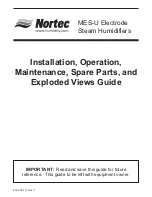
11
container/unit (6) and the water tank (5).
The formation of scale residues could take
place more or less quickly, depending on the
type of water, its hardness and frequency of
use of the appliance. The harder the water,
the quicker the formation of scale residues.
Scale residues decrease performance, in-
crease noise and could compromise the nor-
mal functions of the appliance; it is therefore
highly recommended to perform weekly
cleaning of the appliance as follows:
1. Repeat the operations indicated in the
“Daily cleaning”
paragraph.
2. Prepare a solution of water and white vin-
egar in equal parts, and fill the water tank (5)
with the solution; repeat the process for the
humidifier container/unit (6). Leave the solu-
tion in place for at least 4 hours (even better
if overnight).
3. Rinse thoroughly and repeatedly with
drinking water that has been previously
boiled and left to cool to at least 40°C; dry
gently using a soft cloth.
4. If necessary, repeat the operation until all
the scale residues have been removed.
Warning!!
Ǧ
Never place the appliance under running
water.
Ǧ
If the humidifier
will not be used for a long
period
, after cleaning the appliance, dry the
water tank (5), the humidifier container/
unit (transducer) (6) and the steam outlet
nozzle (3). Also check to see if any dust has
collected on the anti-dust filter (10) installed
in a specific compartment inside the air vent
(9). If a small amount of dust has collected,
simply tap it until the dust comes away; if
it is very dirty, rinse it under running water.
Once it is clean and dry, replace it inside the
air vent compartment.
Ǧ
Never allow the power cable (8) or air vents
(9) to come into contact with water.
Ǧ
Do not scratch the transducer with any
tools. Do not clean with chemical or abrasive
products.
Summary of Contents for COMFORT NEB
Page 1: ...COMFORT NEB Cold Humidi er Humidi cador en fr o Humidi cateur froid...
Page 2: ...2 Fig A 1 2 5 6 3 4 7 9 8 10...
Page 3: ...3 Fig B Fig C Fig D WW XW...
Page 4: ...4 Fig E Fig F I ON MAX MIN O OFF...
Page 5: ...5 Fig H Fig G XW...
Page 25: ...25 Note...
Page 26: ...26 Note...
Page 27: ...27 Note...












































